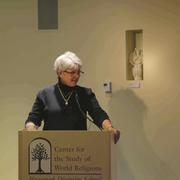
On April 7 in the evening, Professor Laurel C. Schneider (Religious Studies, Religion and Culture, Vanderbilt University) lectured on the theme, “When the Book Is a Coyote: Some Challenges and Possibilities for Comparative Theology from the Study of Native American Traditions.” This very well-received lecture was made possible by the generous funding we have received from the Luce Foundation in support of our Comparative Theology Lecture Series.
It was an excellent event in several ways. First, it enabled us to think seriously about Native American traditions, traditions that have rarely become the focus of attention even at the Center. By attention to geography, the retelling of stories, and reflections on her conversations with elders, Schneider opened for us a way into thinking with the Cherokee and other tribal traditions. While this one lecture could open begin to open up our thinking in this regard, it was an excellent start.
Second, attention to Native American traditions prompts us to think different about how we do our theological reflection. When the book is a coyote — or a bear or a raven or the stone we stumble upon in the path – we need to learn to stop and listen, stay local, and resist the temptation too quickly to generalize or universalize. Our ordinary scholarly habits, which usually serve us very well, may here get in the way; our usual vigorous pursuit of answers to questions may have to defer to a kind of waiting and watching. If so, we then have to rethink even our presumption that we should learn, appropriate, digest, and quickly write up and publish what we have learned — and may rather have to learn to share it in more immediate conversations, in classrooms and small engaged learning groups. “Comparison” will then also prompt a different manner of self-scrutiny, as we look not just to what we have read and know from study, but also to where we are, what is nearby and of particular importance to us in understanding the world, and how we communicate here and now in ways appropriate to different communities and audiences.
Third, Schneider could therefore remind us how our theological categories – Christian, for instance – might likewise have to be modified, regarding method, generalization, and even claims about the universality of truth. Not that there cannot be universal truths — a topic for another day – but that some events and persons and things communicate most powerfully in their local specificity, ever resistant to systematization. Such would be, it is clear, the beginning not just of “a Christian theology of Native American religions,” for example, but of a re-grounding of Christian theology in a more sacramental, symbolic and spatial modality, incarnational in a very specific and local sense.
A lot for one evening indeed — even as we admit that much of Schneider’s rich and eloquent presentation is barely mentioned here.
While it remains true that even the Center has much more to do if it is to integrate Native traditions into its regular conversations, I am happy to note that next fall, date to be decided, Dr. Richard Grounds, Executive Director of the Euchee/Yuchi Language Project, will give the annual Dana McLean Greeley Lecture for Peace and Social Justice.
—By Francis X. Clooney, Director of the Center for the Study of World Religions
